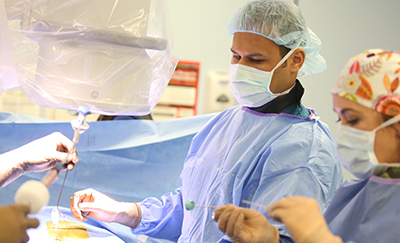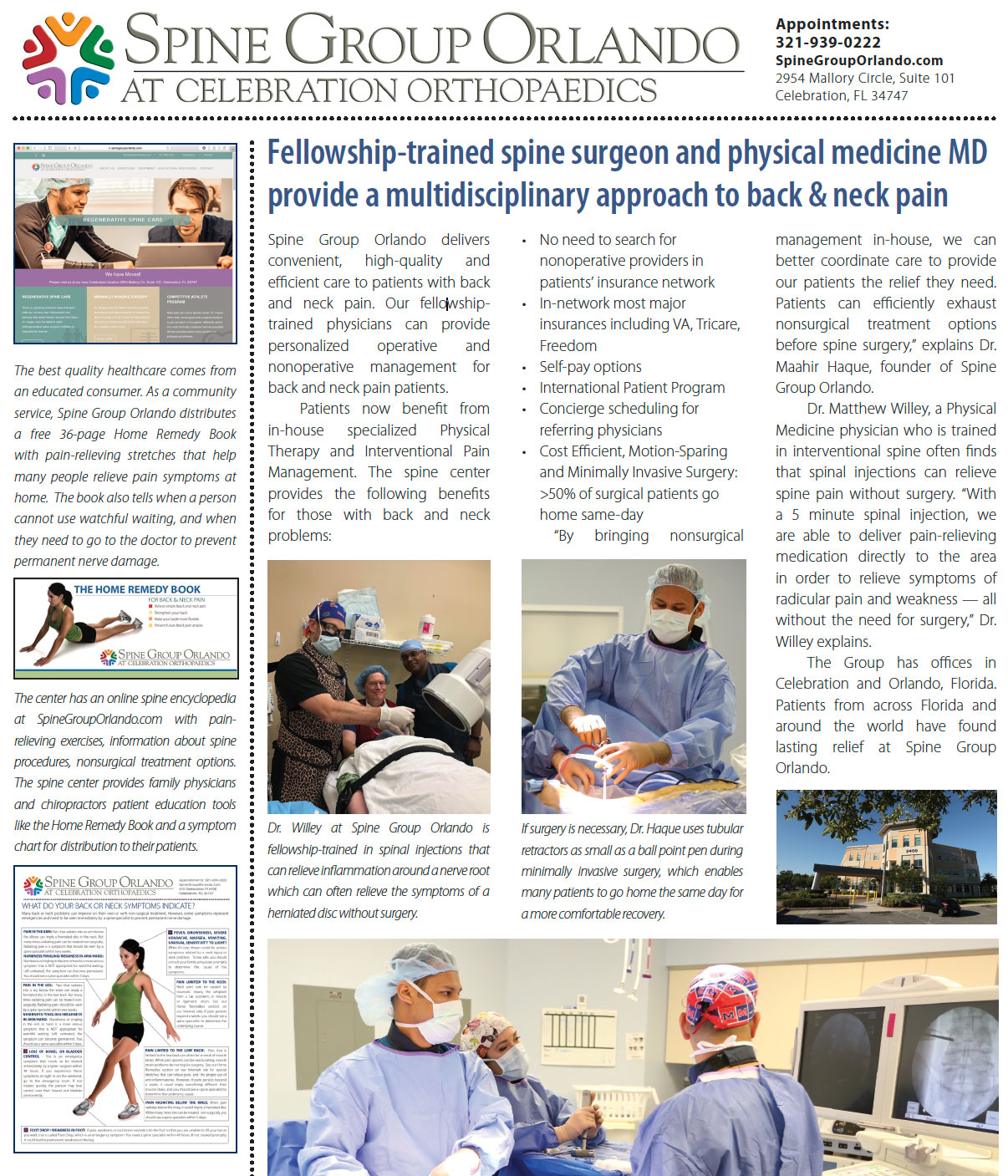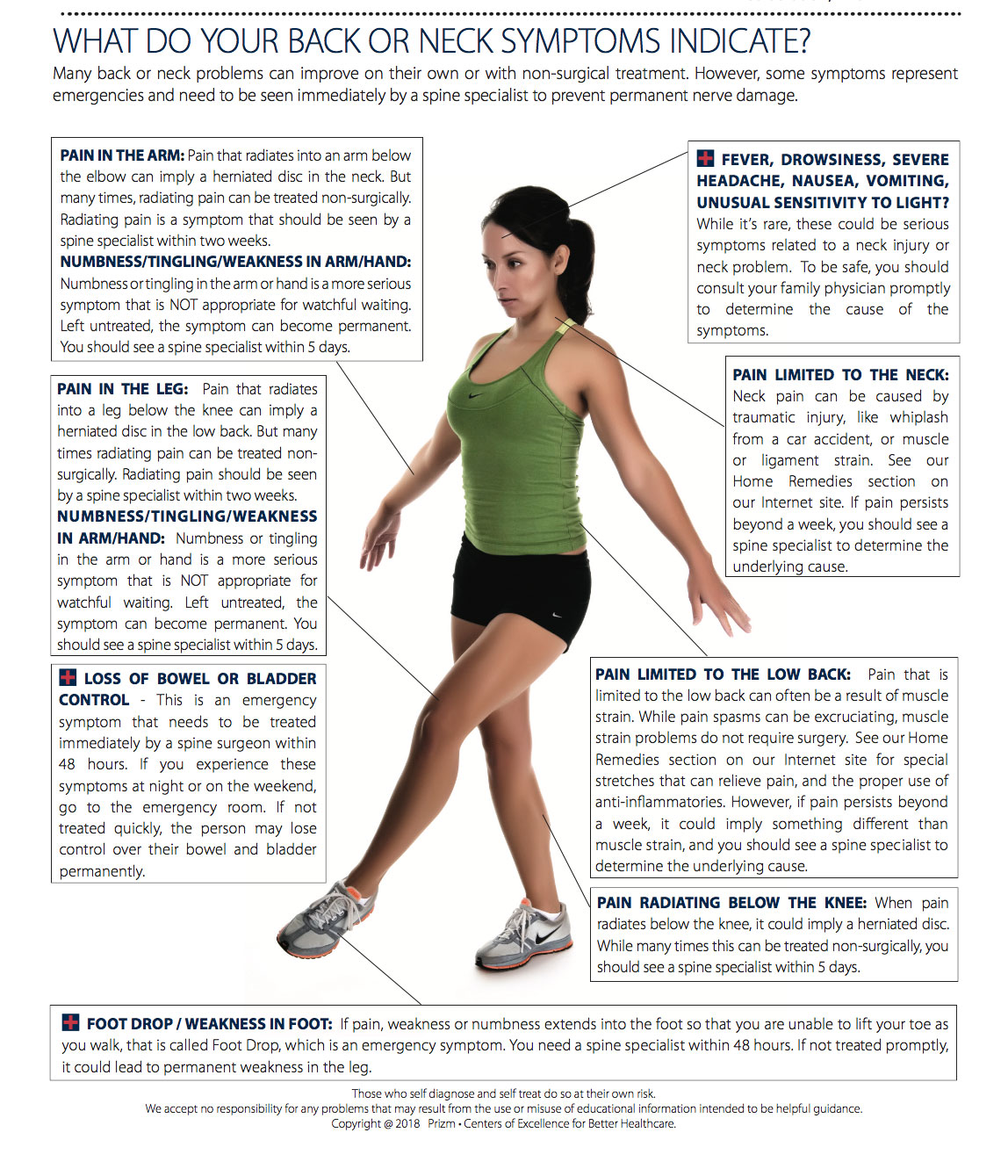When to see a spine specialist
With back and neck pain so widespread, often those with back pain symptoms will make trips to multiple locations: a chiropractor office, to their family practice physician, who then refer the patient with persistent symptoms to a spine surgeon.
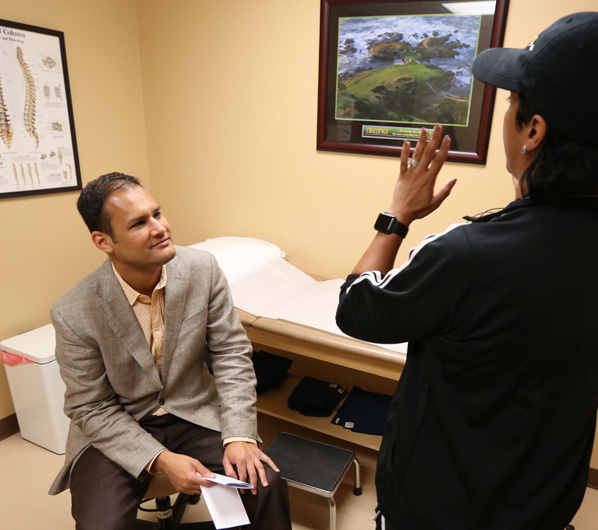 For the person with an aching back, the journey to multiple locations to suffer through a variety of conflicting opinions, uncoordinated care and treatment plans can be a major headache on top of a backache. Simply having to describe your symptoms and your medical history five times to medical providers who don’t communicate with each other can provide an additional headache on top of the backache.
For the person with an aching back, the journey to multiple locations to suffer through a variety of conflicting opinions, uncoordinated care and treatment plans can be a major headache on top of a backache. Simply having to describe your symptoms and your medical history five times to medical providers who don’t communicate with each other can provide an additional headache on top of the backache.
The sad reality is that there is often a lack of coordination among the different specialists treating back and neck conditions. Worse, health insurance medical directors often complain that a single back pain patient can see 10 different doctors and receive 10 different diagnoses and 10 different treatment recommendations. Treatment variation is rampant in the area of back pain.
Another issue with back and neck pain is that in many cities, non-surgical treatment options for back pain and neck pain are either non-existent, poorly designed or simply worthless in that they may feel good (massage) but cure nothing. Consequently, non-surgical options like these are doomed to failure.
And when non-surgical options fail, this forces the patient to resort to surgery, in some cases, unnecessarily. An unnecessary spine surgery can unfortunately just create a bigger nightmare for the person, as scarring around a nerve root from surgery can create failed back surgery syndrome, which is worse than any original pain symptom.
For the person with a spine problem that doesn’t involve trauma, non-surgical treatment options can include:
1. Non-surgical spine therapy or chiropractic.
2. Oral medication from your primary care physician designed to reduce inflammation and relieve pain symptoms.
3 Spinal injections that can relieve the symptoms of a herniated or bulging disc. Through the use of an epidural steroid injection, the spine specialist is able to reduce inflammation around a nerve root. This in turn can relieve the symptoms of radiating pain into a leg or arm, or deficit (weakness or numbness in a hand or foot).
Spine surgery
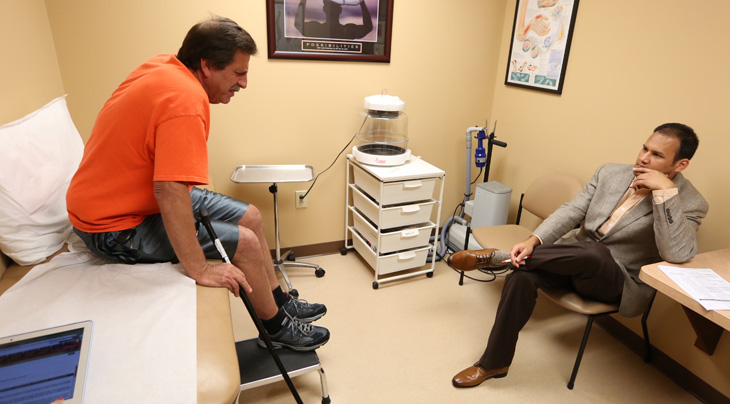 For those with a herniated disc or a spinal fracture, non-surgical treatment may have limited success. Ultimately, spine surgery may be needed to correct a herniated disc that is causing extreme radiating pain, or more seriously, weakness or numbness into a leg or arm.
For those with a herniated disc or a spinal fracture, non-surgical treatment may have limited success. Ultimately, spine surgery may be needed to correct a herniated disc that is causing extreme radiating pain, or more seriously, weakness or numbness into a leg or arm.
The good news is that a spine surgeon who is trained in minimally invasive surgery, can perform many disc operations through a tubular retractor roughly the size of a ballpoint pen. While this type of minimally invasive surgery can involve more training to operate through a half-inch incision rather than an open 3-inch long incision, the benefits are huge for the patient. A tiny incision means less disruption to muscles and ligaments and a quicker, less painful recovery. Consequently, most patients can have their spine surgery in the morning and be home later the same day to recover in the comfort of their own home.
Maahir Haque, MD is recognized as a leader in the field of minimally invasive spine surgery. At Spine Group Orlando, Dr. Maahir Haque also provides second opinions for spine surgery and MRI reviews for those with back pain and neck pain. Dr. Haque emphasizes non-surgical options for back pain and neck pain where possible. This can include accessing a back pain specialist with expertise in pain-relieving spinal injections and spine therapists. Spine therapy can include back stretches that can be a future home remedy for back pain or neck pain. If spine surgery is necessary because of a herniated disc, spinal fracture, or spinal stenosis, Dr. Maahir Haque operates through tubular retractors that reduce the size of the incision, lessen blood loss, reduce time in the hospital, speed return to activity with a less painful recovery. This spine surgery expertise enables many patients to have outpatient spine surgery and be home the same day. Spine Group Orlando and Dr. Maahir Haque provides artificial disc replacement in the neck using the Mobi-C disc implant, the first FDA-approved disc for multiple levels in the neck. Prodisc-C is also used for artificial disc replacement in the cervical spine. Dr. Haque is also one of the few spine surgeons in Orlando, Florida to provide lumbar artificial disc replacement using the Prodisc-L artificial disc. Dr. Haque is also referred patients from across Orlando and north central Florida for artificial disc replacement surgery as an alternative to spinal fusion. Accordingly, Dr. Haque's patients travel from across north central Florida, including: Orlando; Jacksonville; Tallahassee; Lakeland; Gainesville; Tampa; Daytona Beach; and Cocoa Beach. The spine center, as a destination for medical tourism for some international patients from Mexico and the Caribbean, can provide recommendations to out-of-town patients on nearby hotels and tourist attractions. Dr. Haque is featured on the national site CentersforArtificialDisc.com as an author on the subject of artificial disc replacement for herniated discs in the neck. The Centers for Artificial Disc web site has content specific to disc replacement options and alternatives to spinal fusion. Click here to visit the Centers for Artificial Disc.

